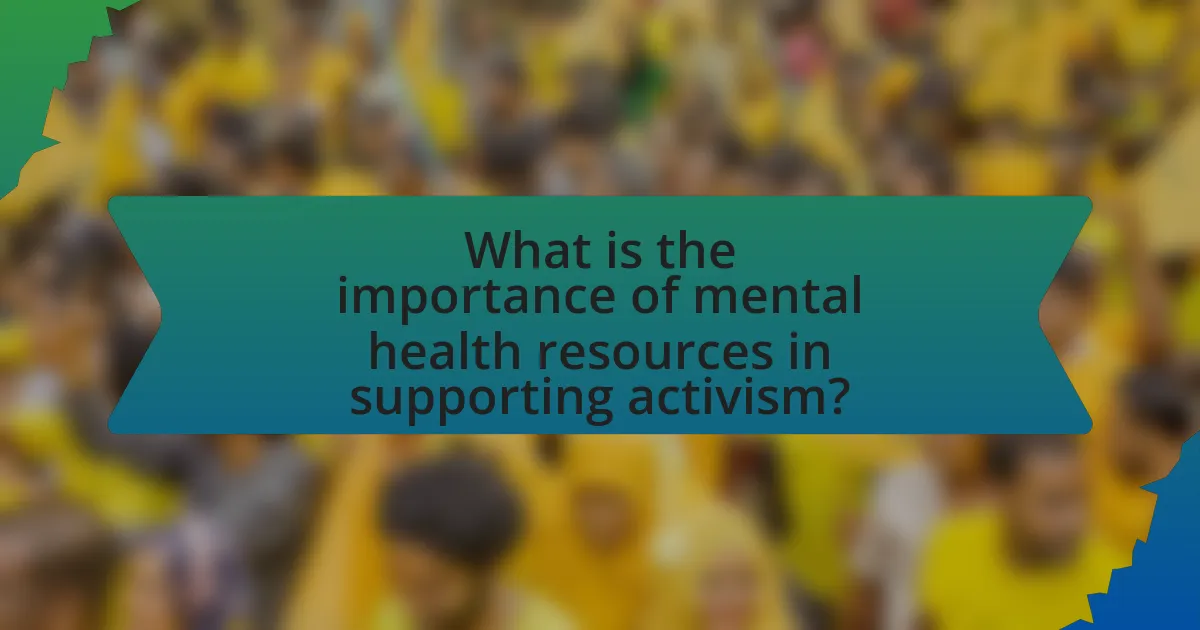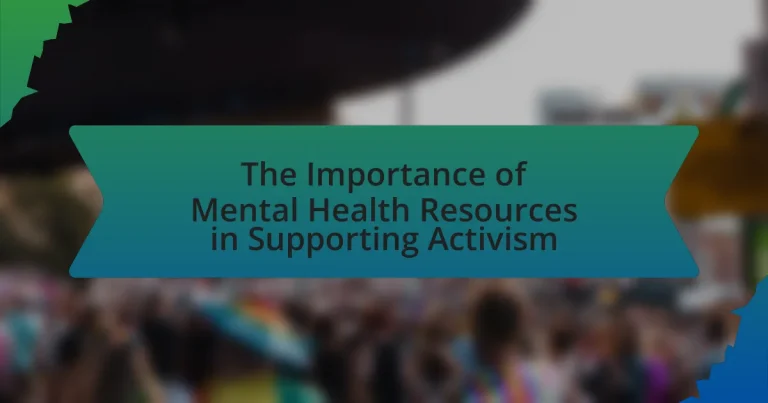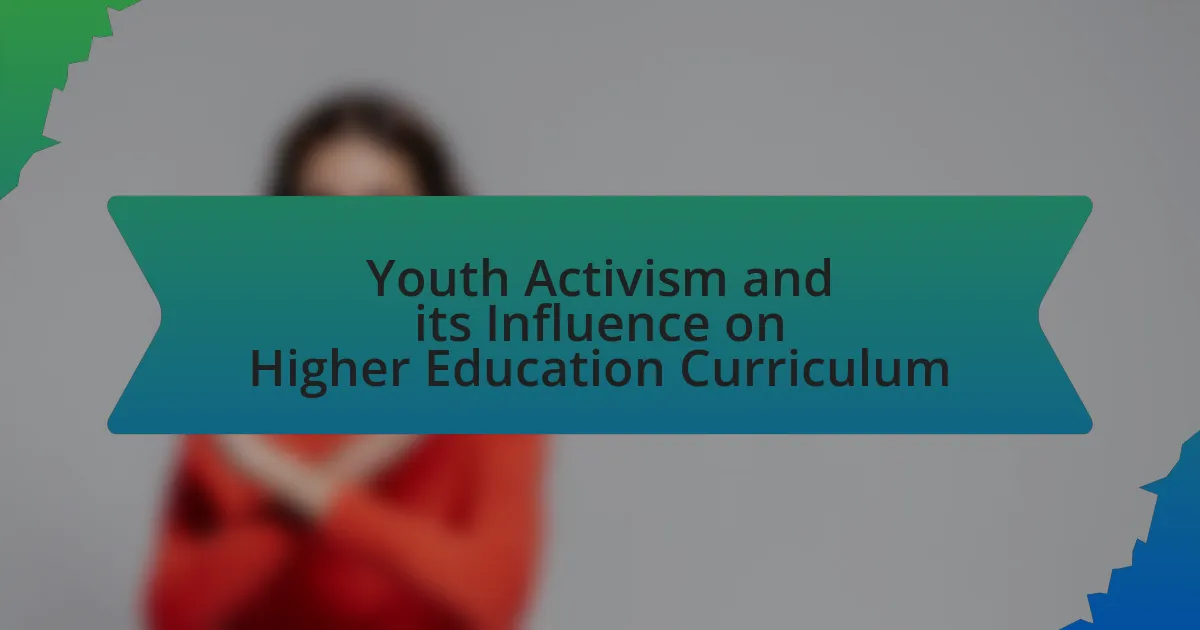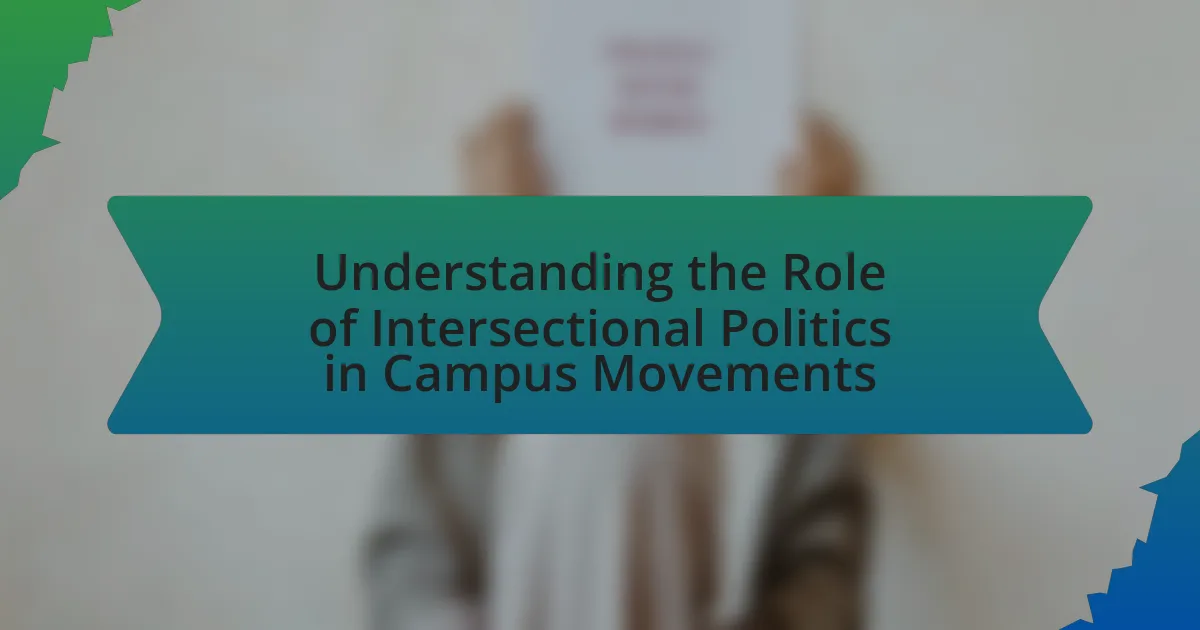The article emphasizes the critical role of mental health resources in supporting activism, highlighting their importance in helping activists cope with the emotional and psychological stress inherent in advocacy work. It discusses various mental health challenges faced by activists, such as anxiety, burnout, and trauma, and outlines the types of resources available, including counseling, support groups, and self-care workshops. The article also examines how these resources enhance the effectiveness of activism by fostering resilience and reducing burnout, ultimately leading to more impactful social movements. Additionally, it explores the significance of community support systems and peer networks in promoting mental well-being among activists.

What is the importance of mental health resources in supporting activism?
Mental health resources are crucial in supporting activism as they provide individuals with the necessary tools to cope with the emotional and psychological stress associated with advocacy work. Activism often involves confronting systemic injustices, which can lead to burnout, anxiety, and depression among activists. Access to mental health resources, such as counseling and support groups, helps mitigate these effects, enabling activists to sustain their efforts over time. Research indicates that organizations that prioritize mental health support for their members experience higher levels of engagement and resilience, ultimately leading to more effective activism. For instance, a study published in the Journal of Community Psychology found that mental health interventions significantly improved the well-being and productivity of activists, demonstrating the direct link between mental health support and successful advocacy outcomes.
How do mental health resources contribute to the effectiveness of activism?
Mental health resources enhance the effectiveness of activism by providing emotional support, reducing burnout, and fostering resilience among activists. Access to mental health services allows individuals engaged in activism to manage stress and anxiety, which can lead to sustained engagement and productivity. Research indicates that activists who utilize mental health resources report higher levels of motivation and lower rates of burnout, ultimately contributing to more impactful movements. For instance, a study published in the Journal of Community Psychology found that organizations offering mental health support saw a 30% increase in volunteer retention rates, demonstrating the direct correlation between mental well-being and activist effectiveness.
What types of mental health resources are available for activists?
Activists have access to various mental health resources, including counseling services, support groups, online platforms, and self-care workshops. Counseling services provide one-on-one support from licensed professionals who understand the unique challenges faced by activists. Support groups offer a community space for sharing experiences and coping strategies, fostering a sense of belonging. Online platforms, such as mental health apps and websites, provide accessible resources and tools for managing stress and anxiety. Self-care workshops focus on techniques for maintaining mental well-being, emphasizing the importance of resilience in activism. These resources are essential for addressing the emotional toll of activism and promoting overall mental health.
How do these resources address the unique challenges faced by activists?
Mental health resources address the unique challenges faced by activists by providing essential support for emotional resilience and coping strategies. Activism often involves high levels of stress, burnout, and emotional fatigue, which can hinder effectiveness and lead to mental health issues. Resources such as counseling, peer support groups, and stress management workshops equip activists with tools to navigate these challenges, fostering a healthier mindset. For instance, studies show that access to mental health support can reduce anxiety and improve overall well-being, enabling activists to sustain their efforts over time.
Why is mental health crucial for activists?
Mental health is crucial for activists because it directly impacts their resilience, effectiveness, and overall well-being in the face of challenging social and political issues. Activists often encounter high levels of stress, burnout, and emotional fatigue due to the nature of their work, which can lead to decreased motivation and productivity. Research indicates that individuals engaged in activism are at a higher risk for mental health issues, with studies showing that 60% of activists report experiencing anxiety and depression related to their advocacy efforts. Prioritizing mental health enables activists to sustain their efforts, maintain clarity of purpose, and foster supportive communities, ultimately enhancing their capacity to drive social change.
What mental health challenges do activists commonly face?
Activists commonly face mental health challenges such as anxiety, depression, burnout, and trauma. These issues arise from the high levels of stress associated with advocating for social change, often leading to feelings of isolation and hopelessness. Research indicates that 70% of activists report experiencing burnout due to the emotional toll of their work, which can exacerbate mental health conditions. Additionally, the constant exposure to social injustices can lead to vicarious trauma, impacting their overall well-being.
How can mental health issues impact activism outcomes?
Mental health issues can significantly hinder activism outcomes by impairing individuals’ ability to engage effectively in advocacy efforts. When activists experience mental health challenges, such as anxiety or depression, their motivation, focus, and energy levels may decline, leading to decreased participation in campaigns and events. Research indicates that mental health problems can reduce the effectiveness of communication and collaboration among activists, which are crucial for mobilizing support and achieving goals. For instance, a study published in the Journal of Community Psychology found that individuals with untreated mental health conditions were less likely to engage in community organizing and advocacy, ultimately affecting the success of social movements.
What role do community support systems play in mental health for activists?
Community support systems are crucial for the mental health of activists as they provide emotional, social, and practical resources that help mitigate stress and burnout. Activists often face significant challenges, including emotional exhaustion and isolation, which can negatively impact their mental well-being. Research indicates that strong community ties can enhance resilience, reduce feelings of loneliness, and foster a sense of belonging, all of which are vital for maintaining mental health. For instance, a study published in the Journal of Community Psychology found that individuals engaged in activism who had access to supportive networks reported lower levels of anxiety and depression compared to those without such support. This highlights the importance of community support systems in sustaining the mental health of activists.
How can peer support enhance mental well-being among activists?
Peer support can enhance mental well-being among activists by providing a sense of community and shared understanding, which reduces feelings of isolation. Activists often face unique stressors, including burnout and emotional fatigue, and peer support groups offer a safe space for individuals to share experiences and coping strategies. Research indicates that social support is linked to lower levels of anxiety and depression; for instance, a study published in the Journal of Community Psychology found that peer support significantly improved mental health outcomes among individuals engaged in social movements. This collective resilience fosters emotional strength and encourages sustained engagement in activism, ultimately contributing to better mental health for activists.
What are the benefits of creating safe spaces for activists?
Creating safe spaces for activists fosters mental well-being and enhances their effectiveness in advocacy. These environments provide emotional support, allowing activists to share experiences and challenges without fear of judgment or backlash. Research indicates that safe spaces can reduce stress and anxiety, which are prevalent among activists facing societal pushback. For instance, a study published in the Journal of Community Psychology highlights that supportive environments significantly improve resilience and coping strategies among marginalized groups. By promoting mental health, safe spaces empower activists to sustain their efforts and engage more effectively in their causes.
How can mental health resources be integrated into activist movements?
Mental health resources can be integrated into activist movements by establishing support systems that prioritize the psychological well-being of activists. This can include providing access to mental health professionals, creating safe spaces for discussion, and offering workshops focused on coping strategies and resilience. Research indicates that activists often experience burnout and trauma, highlighting the need for mental health support; for instance, a study published in the Journal of Community Psychology found that emotional exhaustion is prevalent among social movement participants. By embedding mental health resources within the framework of activism, movements can sustain their efforts and enhance the overall effectiveness of their campaigns.
What strategies can organizations use to promote mental health awareness?
Organizations can promote mental health awareness by implementing comprehensive training programs for employees and leadership. These programs educate staff about mental health issues, reduce stigma, and encourage open discussions. Research indicates that workplaces with mental health training see a 30% increase in employee engagement and a 25% reduction in absenteeism, according to a study by the World Health Organization. Additionally, organizations can host mental health awareness campaigns, utilizing social media and community events to reach a broader audience. These initiatives can significantly enhance public understanding and support for mental health issues, as evidenced by the National Alliance on Mental Illness, which reports that awareness campaigns lead to increased community resources and support networks.
How can training in mental health first aid benefit activist groups?
Training in mental health first aid can significantly benefit activist groups by equipping members with the skills to identify and respond to mental health crises effectively. This training enhances the group’s ability to support individuals who may experience stress, anxiety, or trauma related to activism, which is often emotionally taxing. Research indicates that activists are at a higher risk for mental health issues due to the nature of their work, which can involve exposure to conflict and social injustice. By implementing mental health first aid training, activist groups can foster a supportive environment, reduce stigma around mental health, and improve overall group resilience, ultimately leading to more sustainable activism efforts.
What are the best practices for maintaining mental health in activism?
The best practices for maintaining mental health in activism include setting clear boundaries, practicing self-care, seeking support, and engaging in regular reflection. Activists should establish limits on their time and emotional investment to prevent burnout, as studies show that overcommitment can lead to mental exhaustion. Self-care activities, such as exercise, meditation, and hobbies, are essential for emotional resilience, supported by research indicating that physical activity can reduce stress and anxiety levels. Seeking support from peers or mental health professionals fosters a sense of community and shared experience, which is crucial for coping with the emotional toll of activism. Regular reflection on personal motivations and experiences helps activists stay grounded and connected to their purpose, enhancing overall mental well-being.
How can activists develop personal coping strategies?
Activists can develop personal coping strategies by engaging in self-care practices, establishing support networks, and practicing mindfulness techniques. Self-care practices, such as regular exercise, adequate sleep, and healthy eating, have been shown to improve mental well-being, which is crucial for sustaining activism efforts. Establishing support networks, including friendships and community groups, provides emotional support and shared experiences, reducing feelings of isolation. Mindfulness techniques, such as meditation and deep-breathing exercises, can help activists manage stress and maintain focus on their goals. Research indicates that these strategies can significantly enhance resilience and emotional regulation, which are essential for effective activism.
What resources are available for ongoing mental health support?
Ongoing mental health support resources include therapy services, support groups, hotlines, and online platforms. Therapy services, such as those provided by licensed psychologists and counselors, offer personalized treatment plans for individuals. Support groups, often facilitated by mental health professionals, provide a community for sharing experiences and coping strategies. Hotlines, like the National Suicide Prevention Lifeline, offer immediate assistance and guidance. Online platforms, such as BetterHelp and Talkspace, provide accessible therapy options through digital communication. These resources are essential for maintaining mental well-being, especially for individuals engaged in activism, as they help manage stress and emotional challenges associated with advocacy work.




